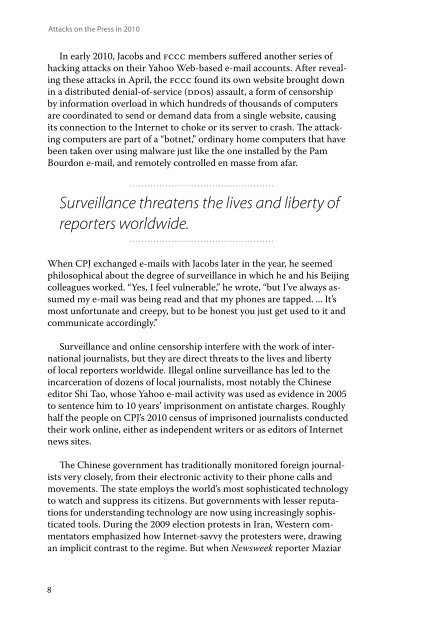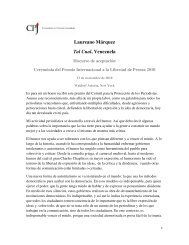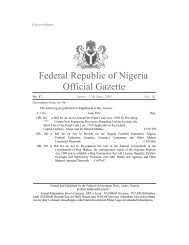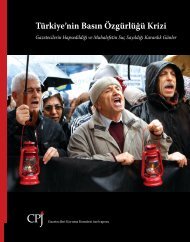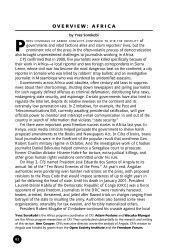- Page 2 and 3: Attacks on the Pre
- Page 4 and 5: Board of Directorshonorary co-chair
- Page 6: Middle East and North AfricaAnalysi
- Page 14 and 15: Introductioninternational organizat
- Page 18 and 19: IntroductionBahari was arrested and
- Page 20: Introductionthe severely restricted
- Page 28 and 29: Africa: AnalysisThat sliver of acce
- Page 30 and 31: Africa: Analysisjournalists and two
- Page 32 and 33: Africa: Analysisretaliation. That c
- Page 34 and 35: Africa: Country Summariessecurity,
- Page 36 and 37: Africa: Country Summarieswas conduc
- Page 38 and 39: Africa: Country Summariesthe journa
- Page 40 and 41: Africa: Country Summariesand was in
- Page 42 and 43: Africa: Country Summariesstories de
- Page 44 and 45: Africa: Country SummariesThe Congol
- Page 46 and 47: Africa: Country Summariesdenied any
- Page 48 and 49: Africa: Country Summariesdemoted by
- Page 50 and 51: Africa: Country SummariesNiger Delt
- Page 52 and 53: Africa: Country Summariesinformatio
- Page 54: Africa: Country Summariessubtle imp
- Page 57 and 58: Attacks on the Pre
- Page 60 and 61: Africa: Country Summariesthe region
- Page 62: Africa: Country Summariespublic dat
- Page 66 and 67:
Africa: Country Summariesjournalist
- Page 68 and 69:
Africa: Country SummariesOne journa
- Page 70 and 71:
Africa: Country SummariesHarare, de
- Page 72 and 73:
Africa: Country Snapshotscountry sn
- Page 74 and 75:
Africa: Country Snapshotshuman righ
- Page 76 and 77:
NigerAfrica: Country Snapshots»»I
- Page 78 and 79:
Attacks on the Pre
- Page 80 and 81:
Americas: AnalysisanalysisIn Latin
- Page 82 and 83:
Americas: AnalysisCenter for Latin
- Page 84 and 85:
Americas: Analysisheavier news cove
- Page 86 and 87:
Americas: Analysisgrip on the regio
- Page 88 and 89:
Americas: Country Summariescountry
- Page 90 and 91:
Americas: Country Summariesgovernme
- Page 92 and 93:
Americas: Country Summariesto her a
- Page 94 and 95:
Americas: Country SummariesTribunal
- Page 97 and 98:
Attacks on the Pre
- Page 99:
Attacks on the Pre
- Page 102 and 103:
Americas: Country Summariesallowed
- Page 104 and 105:
EcuadorAmericas: Country SummariesP
- Page 106 and 107:
Americas: Country Summarieswas also
- Page 108 and 109:
Americas: Country Summariesconditio
- Page 110 and 111:
Americas: Country Summariesto inves
- Page 112 and 113:
Americas: Country Summariesfavorabl
- Page 114 and 115:
Americas: Country Summarieslaw enfo
- Page 116 and 117:
Americas: Country Summarieslocal po
- Page 118 and 119:
Americas: Country SummariesOn Febru
- Page 120 and 121:
Americas: Country SummariesRobert G
- Page 122 and 123:
Americas: Country Summariesbroadcas
- Page 124 and 125:
Americas: Country Summarieslicenses
- Page 126 and 127:
Americas: Country Snapshotscountry
- Page 128 and 129:
PanamaAmericas: Country Snapshots»
- Page 130 and 131:
Asia
- Page 132 and 133:
Asia: AnalysisanalysisPartisan Jour
- Page 134 and 135:
Asia: AnalysisThe Philippines boast
- Page 136 and 137:
Asia: Analysisin Associated Newspap
- Page 138 and 139:
Asia: AnalysisThere are highly poli
- Page 140 and 141:
Asia: Analysisthe line between jour
- Page 142 and 143:
Asia: Country Summariesother U.S. m
- Page 144 and 145:
Asia: Country Summarieswere enough
- Page 146 and 147:
Asia: Country SummariesThe rigged b
- Page 148 and 149:
Asia: Country SummariesInside the c
- Page 150 and 151:
Asia: Country SummariesMadeline Ear
- Page 152 and 153:
Asia: Country SummariesThe National
- Page 154 and 155:
Asia: Country Summariesearthquake,
- Page 156 and 157:
Asia: Country SummariesThe courts a
- Page 158 and 159:
Asia: Country Summariesthe army. Th
- Page 160 and 161:
Asia: Country SummariesThe Federati
- Page 162 and 163:
Asia: Country Summariespopulace and
- Page 164 and 165:
Asia: Country Summaries2009, a pene
- Page 166 and 167:
Asia: Country Summariesgovernment
- Page 168 and 169:
Asia: Country Summariespolice plans
- Page 170 and 171:
Asia: Country SummariesIn a meeting
- Page 172 and 173:
Asia: Country Summariesdirector gen
- Page 174 and 175:
Asia: Country Summariesclaiming UDD
- Page 176 and 177:
Asia: Country SummariesAfter Blogos
- Page 178 and 179:
Asia: Country Summariesa situation
- Page 180 and 181:
Asia: Country Snapshotsunder so-cal
- Page 182 and 183:
Asia: Country Snapshotsorder,” ac
- Page 184 and 185:
Attacks on the Pre
- Page 186 and 187:
Europe and Central Asia: Analysisan
- Page 188 and 189:
Europe and Central Asia: Analysisco
- Page 190 and 191:
Europe and Central Asia: Analysisot
- Page 192 and 193:
Europe and Central Asia: Analysisju
- Page 194 and 195:
Europe and Central Asia: Country Su
- Page 196 and 197:
Europe and Central Asia: Country Su
- Page 198 and 199:
Europe and Central Asia: Country Su
- Page 200 and 201:
Europe and Central Asia: Country Su
- Page 202 and 203:
Europe and Central Asia: Country Su
- Page 204 and 205:
Europe and Central Asia: Country Su
- Page 206 and 207:
Europe and Central Asia: Country Su
- Page 208 and 209:
Europe and Central Asia: Country Su
- Page 210 and 211:
Europe and Central Asia: Country Su
- Page 212 and 213:
Europe and Central Asia: Country Su
- Page 214 and 215:
Europe and Central Asia: Country Su
- Page 216 and 217:
Europe and Central Asia: Country Su
- Page 218 and 219:
Europe and Central Asia: Country Su
- Page 220 and 221:
Europe and Central Asia: Country Su
- Page 222 and 223:
Europe and Central Asia: Country Su
- Page 224 and 225:
Europe and Central Asia: Country Su
- Page 226 and 227:
Europe and Central Asia: Country Sn
- Page 228 and 229:
SpainEurope and Central Asia: Count
- Page 230 and 231:
Attacks on the Pre
- Page 232 and 233:
Middle East and North Africa: Analy
- Page 234 and 235:
Middle East and North Africa: Analy
- Page 236 and 237:
Middle East and North Africa: Analy
- Page 238 and 239:
Middle East and North Africa: Analy
- Page 240 and 241:
Middle East and North Africa: Analy
- Page 242 and 243:
Middle East and North Africa: Count
- Page 244 and 245:
Middle East and North Africa: Count
- Page 246 and 247:
Middle East and North Africa: Count
- Page 248 and 249:
Middle East and North Africa: Count
- Page 250 and 251:
Middle East and North Africa: Count
- Page 252 and 253:
Middle East and North Africa: Count
- Page 254 and 255:
Middle East and North Africa: Count
- Page 256 and 257:
Middle East and North Africa: Count
- Page 258 and 259:
Middle East and North Africa: Count
- Page 260 and 261:
Middle East and North Africa: Count
- Page 262 and 263:
MoroccoMiddle East and North Africa
- Page 264 and 265:
Middle East and North Africa: Count
- Page 266 and 267:
Middle East and North Africa: Count
- Page 268 and 269:
Middle East and North Africa: Count
- Page 270 and 271:
Middle East and North Africa: Count
- Page 272 and 273:
Middle East and North Africa: Count
- Page 274 and 275:
Middle East and North Africa: Count
- Page 276 and 277:
Middle East and North Africa: Count
- Page 278 and 279:
Middle East and North Africa: Count
- Page 280 and 281:
Middle East and North Africa: Count
- Page 282 and 283:
Middle East and North Africa: Count
- Page 284 and 285:
Middle East and North Africa: Count
- Page 286 and 287:
Attacks on the Pre
- Page 288 and 289:
Journalists Killed: Analysisjournal
- Page 290 and 291:
Journalists Killed: Analysismilitar
- Page 292 and 293:
Journalists Killed: Motive Confirme
- Page 294 and 295:
Journalists Killed: Motive Confirme
- Page 296 and 297:
Journalists Killed: Motive Confirme
- Page 298 and 299:
Journalists Killed: Motive Confirme
- Page 300 and 301:
Journalists Killed: Motive Confirme
- Page 302 and 303:
Journalists Killed: Motive Confirme
- Page 304 and 305:
Journalists Killed: Motive Confirme
- Page 306 and 307:
Journalists Killed: Motive Confirme
- Page 308 and 309:
Journalists Killed: Motive Confirme
- Page 310 and 311:
Journalists Killed: Motive Confirme
- Page 312 and 313:
Journalists Killed: Motive Confirme
- Page 314 and 315:
Journalists Killed: Motive Confirme
- Page 316 and 317:
Journalists Killed: Motive Confirme
- Page 318 and 319:
Media Workers Killed4 Media Workers
- Page 320 and 321:
Journalists Killed: Motive Unconfir
- Page 322 and 323:
Journalists Killed: Motive Unconfir
- Page 324 and 325:
Journalists Killed: Motive Unconfir
- Page 326 and 327:
Journalists Killed: Motive Unconfir
- Page 328 and 329:
Journalists Killed: Motive Unconfir
- Page 330 and 331:
Journalists Killed: Motive Unconfir
- Page 332 and 333:
Journalists Killed: Motive Unconfir
- Page 334 and 335:
Journalists Killed: Motive Unconfir
- Page 336 and 337:
Attacks on the Pre
- Page 338 and 339:
Journalists in Prison: Analysisas t
- Page 340:
Journalists in Prison: Analysis•
- Page 343 and 344:
Attacks on the Pre
- Page 345 and 346:
Attacks on the Pre
- Page 347 and 348:
Attacks on the Pre
- Page 349 and 350:
Attacks on the Pre
- Page 351 and 352:
Attacks on the Pre
- Page 353 and 354:
Attacks on the Pre
- Page 355 and 356:
Attacks on the Pre
- Page 357 and 358:
Attacks on the Pre
- Page 360 and 361:
Journalists in PrisonIntermediate P
- Page 362 and 363:
Journalists in Prisonhe protested s
- Page 364 and 365:
Journalists in PrisonQi was accused
- Page 366 and 367:
Journalists in Prisonon March 25, 2
- Page 368 and 369:
Journalists in Prisonimprisoned: ju
- Page 370 and 371:
Journalists in Prisonanniversary ha
- Page 372 and 373:
Journalists in Prisonimprisoned: ju
- Page 374 and 375:
Journalists in Prisonto the Dharams
- Page 376 and 377:
Journalists in Prisonleave the coun
- Page 378 and 379:
Journalists in PrisonA story publis
- Page 380 and 381:
Journalists in PrisonSecurity agent
- Page 382 and 383:
Journalists in PrisonAsked about Is
- Page 384 and 385:
Journalists in Prisoncontrolled nat
- Page 386 and 387:
Journalists in PrisonSecurity agent
- Page 388 and 389:
Journalists in Prisonclose to the j
- Page 390 and 391:
Journalists in PrisonAfter his 2009
- Page 392 and 393:
Journalists in Prisonassociation sa
- Page 394 and 395:
Journalists in Prisonimprisoned: se
- Page 396 and 397:
Journalists in Prisonsustained his
- Page 398 and 399:
Journalists in PrisonShahidi worked
- Page 400 and 401:
Journalists in PrisonIntelligence a
- Page 402 and 403:
Journalists in PrisonIraq: 1impriso
- Page 404 and 405:
Journalists in Prisonclashes in sou
- Page 406 and 407:
Journalists in PrisonMoldova and Ro
- Page 408 and 409:
Journalists in Prisonthe human righ
- Page 410 and 411:
Journalists in Prisoncriminal convi
- Page 412 and 413:
Journalists in PrisonAccording to C
- Page 414 and 415:
Journalists in Prisonimprisoned: ju
- Page 416 and 417:
Journalists in Prisonoutspoken comm
- Page 418 and 419:
Journalists in PrisonTra’s arrest
- Page 420 and 421:
CPJ International Press Freedom Awa
- Page 422 and 423:
CPJ International Press Freedom Awa
- Page 424 and 425:
CPJ International Press Freedom Awa
- Page 426 and 427:
CPJ Burton Benjamin Memorial AwardC
- Page 428 and 429:
CPJ at a GlanceCPJ at a GlanceHow d
- Page 430 and 431:
How to Report an Attack on the Pres
- Page 432 and 433:
How to Report an Attack on the Pres
- Page 434 and 435:
CPJ Staffcommunications assistantMa
- Page 436 and 437:
Spotlight on GivingSpotlight on Giv
- Page 438 and 439:
ContributorsThe Philip L. Graham Fu
- Page 440:
Index by CountryItaly 218Ivory Coas


